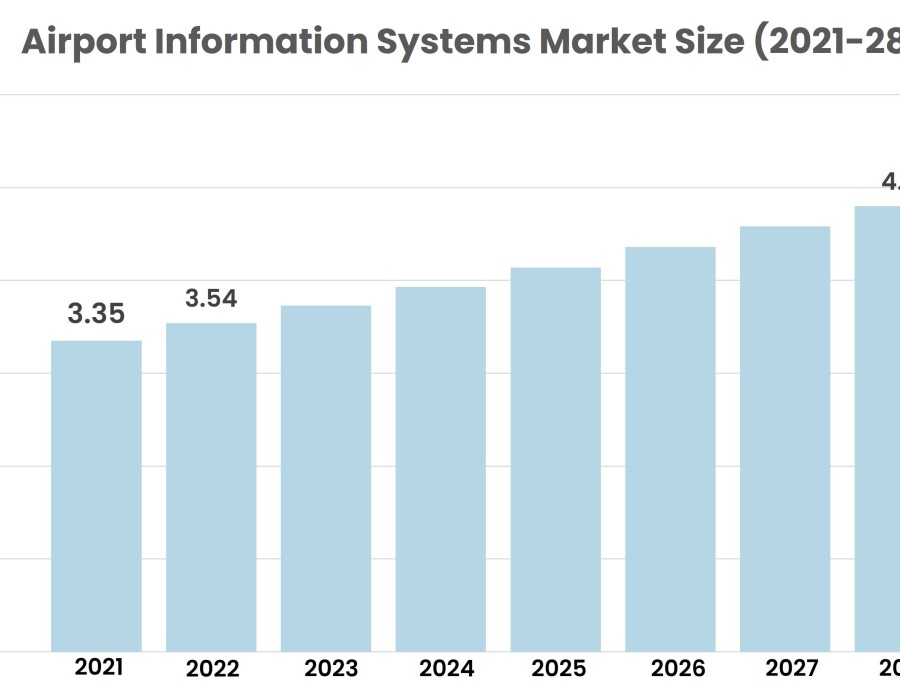According to Stratview Research, the airport information systems market was estimated at USD 3.35 billion in 2021 and is likely to grow at a CAGR of 5.2% during 2022-2028 to reach USD 4.8 billion in 2028.
In the bustling world of air travel, airports serve as critical hubs that orchestrate the intricate dance of flights, passengers, and cargo. Behind the scenes, a sophisticated network of technology systems works tirelessly to ensure that operations run smoothly and efficiently. At the core of this network are Airport Information Systems (AIS), which play a pivotal role in managing airport operations, enhancing passenger experiences, and optimizing overall efficiency. In this article, we delve into how Airport Information Systems are revolutionizing air travel by enhancing efficiency at every stage of the journey.
Streamlining Passenger Processing
One of the primary functions of Airport Information Systems is to streamline passenger processing, from check-in to boarding. Self-service kiosks, mobile check-in apps, and automated passport control systems are just a few examples of AIS technologies that expedite the passenger journey. By reducing queuing times and minimizing manual interventions, these systems not only improve passenger satisfaction but also enable airports to handle larger volumes of passengers efficiently.
Optimizing Baggage Handling
Baggage handling is another area where Airport Information Systems have made significant strides in efficiency. Advanced baggage tracking systems utilize RFID technology to monitor the movement of luggage throughout the airport, ensuring that bags are routed correctly and delivered to the appropriate aircraft on time. This reduces the risk of mishandled baggage and enables airlines to meet strict departure schedules, ultimately enhancing the overall passenger experience.
Real-Time Flight Information
Flight Information Display Systems (FIDS) are a critical component of Airport Information Systems, providing passengers with real-time information about flight schedules, gate assignments, and boarding status. By keeping passengers informed and up-to-date, FIDS minimize confusion and alleviate stress, particularly during times of disruption such as flight delays or gate changes. This transparency enhances the overall travel experience and fosters greater passenger satisfaction.
Centralized Airport Operations
Airport Operations Control Centers (AOCCs) serve as nerve centers that coordinate and monitor various airport activities in real-time. From managing runway operations to allocating gate assignments and coordinating ground services, AOCCs ensure that all aspects of airport operations run smoothly and efficiently. By centralizing control and communication, AOCCs enable airports to respond quickly to changing conditions and optimize resource utilization.
Enhancing Security and Safety
Airport Information Systems also play a crucial role in enhancing security and safety at airports. Integrated security systems, including CCTV surveillance, access control, and passenger screening technologies, enable airports to detect and respond to security threats proactively. Additionally, AIS facilitate communication and coordination among security personnel, law enforcement agencies, and emergency responders, ensuring a swift and effective response to security incidents or emergencies.
Future Outlook
As technology continues to evolve, Airport Information Systems will play an increasingly vital role in shaping the future of air travel. Emerging technologies such as biometrics, artificial intelligence, and predictive analytics hold the promise of further enhancing efficiency, security, and passenger experiences at airports. Moreover, as airports strive to accommodate growing passenger volumes and meet sustainability goals, AIS will continue to evolve to meet the demands of the modern aviation industry.
Conclusion
Airport Information Systems are the unsung heroes of air travel, working tirelessly behind the scenes to ensure that airports operate smoothly, safely, and efficiently. From streamlining passenger processing to optimizing baggage handling, providing real-time flight information, and enhancing security, AIS play a central role in every aspect of airport operations. As air travel continues to grow and evolve, Airport Information Systems will remain essential tools for enhancing efficiency, improving passenger experiences, and ensuring the seamless operation of airports around the world






Comments